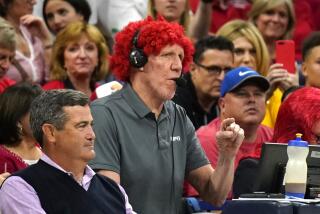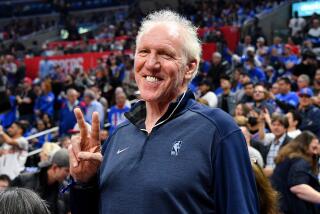Jodie Burton’s winning partnerships
- Share via
Together they strategized game plans, celebrated wins and mourned losses.
Jodie Burton coached the women’s basketball team; her husband, David Wells, coached the men; and life ticked happily by, season after season.
In January, Burton won her 500th game with Claremont-Mudd-Scripps, a milestone for which she credited her partner. “I’m a better basketball coach because I married him,” she said.
Burton is in her 32nd season coaching at Claremont, her players drawn from three colleges — Claremont McKenna, Harvey Mudd and Scripps — that belong to an academically prestigious consortium. Only nine NCAA coaches have coached the same program longer.
But when she started there in 1979, she was 25 and had almost no coaching experience.
She would learn the trade largely from Wells, who gave her a tour of the campus on the day of her interview. She recalls thinking the charming, tree-lined college grounds were beautiful — and that her guide, handsome with neatly parted dark hair and a kind smile, wasn’t bad either.
Wells was just a little older than she was but had already been coaching the Claremont men for a few seasons.
They strolled around the cozy hamlet known as the “city of trees and PhDs” nestled 35 miles east of downtown Los Angeles in the shadows of the San Gabriel Mountains. A few months later, when they were colleagues, he asked her out.
They married in 1982 having already made a promise: Neither would accept a better coaching offer elsewhere unless that college offered the other a head coaching job too.
They were a package deal, a team.
::
Twenty-eight years ago Wednesday, Burton gave birth to the couple’s first son, John — about an hour after she finished up a practice.
That same night, Wells’ team won its first Southern California Intercollegiate Athletic Conference championship by beating Caltech. He missed it, though, because he was with his wife.
They tried to separate their personal and professional lives, but it was difficult. In the beginning, when Burton lacked coaching experience, Wells taught her to break down film and how to go about recruiting. Their 10-by-12 offices were side by side.
“You wouldn’t necessarily have known they were husband and wife,” said Athletic Director Michael Sutton, who was hired the same year as Burton. But their affection did show.
“He adored her,” said Erin Lindsey, who played for Burton from 1981 to 1985. “He was a really hyper-focused kind of guy, except around Jodie.”
When Burton was pregnant, Wells even helped coach her teams.
“She taught the discipline side and he instilled confidence as a player,” said Julia Hodgkins-Bruening, who played for Claremont from 1984 to 1988 and later eight seasons professionally in Germany. “They bounced ideas off each other. They were a perfect match.”
A few job offers came from bigger schools, but none wanted both of them as head coaches. So, they stayed in the foothill town with overhanging shade trees to coach players more likely to become doctors or lawyers than professional basketball players.
“Basketball isn’t at the forefront,” Burton said of her players. “They’re here, for the most part, because they love it.”
Along the way, Burton has fought hard for women’s athletics, a passion that dates to when she was 6 and was told no when she wanted to sign up to play Pop Warner football with her two older brothers.
“That’s why I’m so adamant,” said Burton, who was raised in Whittier. “I don’t want other little girls to feel like I did.”
Women’s athletics were relatively new at Claremont when she was hired, and she has coached all but eight of the 195 players to have suited up for the women’s basketball program. She has also won more games than any men’s or women’s coach in conference history.
But she said she doesn’t care about records — and didn’t even know she was near 500 wins until the day before she reached it.
She tried to play it cool before the game, but the pressure got to her team, which in the first half missed 22 consecutive shots before rallying for the win.
Afterward, the players presented her with a photo and game ball as mementos. A disciplinarian, Burton works to keep her emotions tucked away, but she couldn’t.
She cried a little.
Not too many days later, she said during an interview that she wasn’t sure how much longer she would stay at Claremont — but that she wouldn’t coach anywhere else.
After all, Claremont helped her survive the hardest time in her life.
She cried a little when talking about that, too.
::
In the summer of 1995, Wells was diagnosed with throat cancer, requiring intense radiation treatment four days a week for two months.
He seemed to get better, though, and his 1995-96 team made him an SCIAC champion for the sixth time.
But for the final time.
The cancer returned in the fall of 1998. Wells coached the first four games that season but couldn’t continue.
“I’m good from the neck down, but there are a few concerns from the neck up,” he’d say when people asked about his condition.
Those close to him noted a change.
“He could be so focused on basketball that he’d walk by you and not see you,” Burton said. “After he got cancer, he saw everyone.”
Wells’ dream had long been for him and his wife to coach side by side, and for two seasons, from 1999 to 2001, they did: He was her assistant coach.
With a tracheal tube in his throat his voice was faint, so Wells wrote instructions on a yellow legal pad. “He was fabulous,” Burton recalled. “The women loved him.”
The final season they worked together, the team won its fifth conference championship.
Wells died a few months later while in Arizona with Burton and their sons, whom he was coaching in baseball. “Always a coach,” Burton said. He was 50.
Burton took the next season off before returning to her post at Claremont. But there was no doubt about her coming back.
“I wouldn’t have survived without this place,” she said, her hazel-green eyes welling with tears.
She mentioned a note Wells wrote during a cancer support group meeting that, because his voiced had already failed him, he asked another member to read aloud.
It was about that final season together.
“I just had one of the most wonderful moments of my life, standing on the ladder and cutting down the net with my wife,” he wrote.
His seat on the bench next to her isn’t empty, though.
It has been filled by a new assistant coach who has a kind, familiar smile.
Their first son, John.
twitter.com/baxterholmes
More to Read
Go beyond the scoreboard
Get the latest on L.A.'s teams in the daily Sports Report newsletter.
You may occasionally receive promotional content from the Los Angeles Times.










